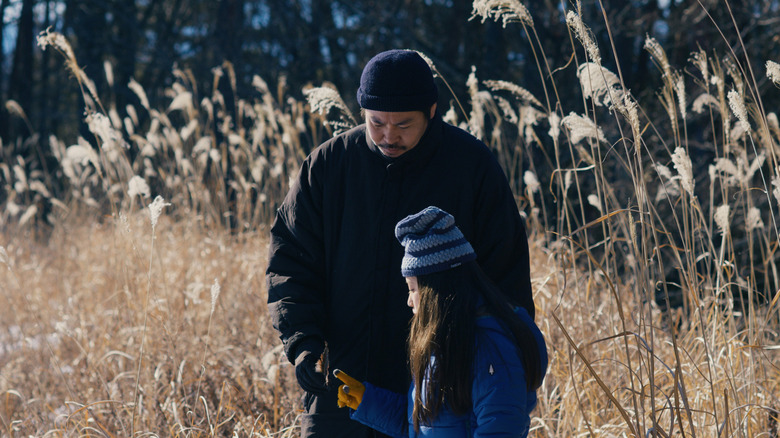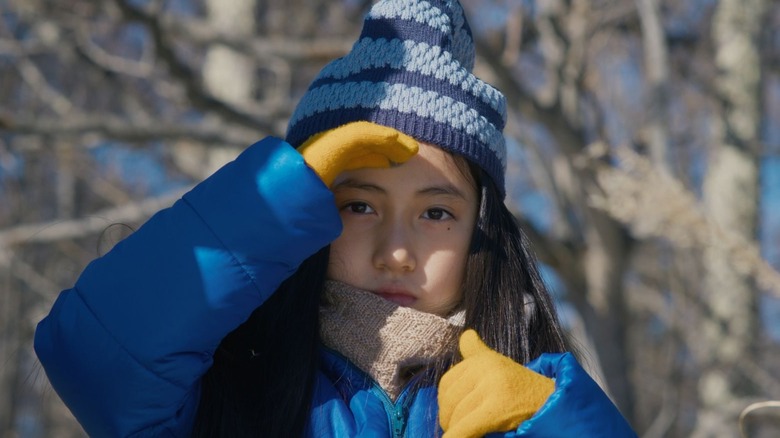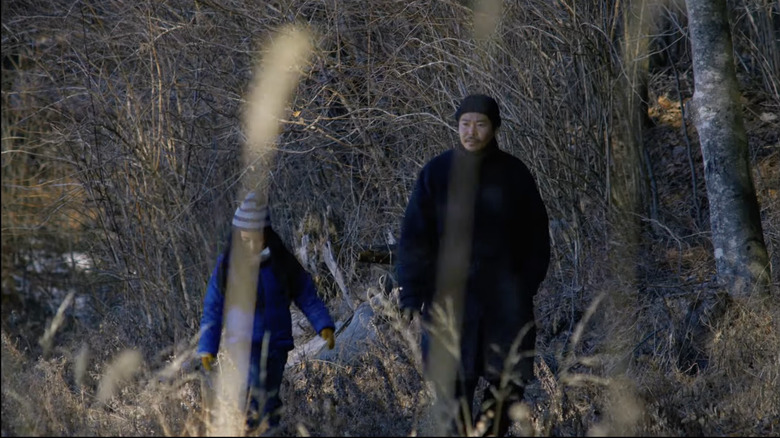Evil Does Not Exist Review: Ryusuke Hamaguchi's Eco-Thriller Evokes Chills And Disharmony [NYFF 2023]
At first, you might not detect the tonal deception seeded into Ryusuke Hamaguchi's "Evil Does Not Exist." Yet, seemingly innocuous nature shots unfold into a thriller. With a penchant for revealing character in long takes, Hamaguchi opens "Evil Does Not Exist" with a lengthy full-shot of a forest villager, Takami (Hitoshi Omika) chopping firewood. The rustic elegance looms large in this frame. However, the forest days are numbered. Hunting gunshots cackle from the distance. Bullet-by-bullet, the ecological peace is being penetrated.
Hamaguchi's modern eco-cautionary tale (a short film concept expanded into a feature-length) does not expound grand visuals of ravaged landscapes, but rather indicates the micro-forces that are already upsetting the balance in the fictional Mizubiki Village (the snow, verdant wasabi plants, and tree thorns crisply toned by Yoshio Kitagawa's cinematography). Among the 6,000 villagers, Takami lives his serene existence chopping firewood, performing odd jobs for his neighbors, and raising his 8-year-old daughter (Ryo Nishikawa). The villagers' bond with the land is illustrated in delicate slice-of-life strokes, in such moments as Takami and a neighbor sampling wild wasabi leaves or his daughter brushing a bird feather. Interestingly, the film later mentions that most of the villagers are descendants of farmers who migrated to Mizubiki Village during World War II, a nod to past upheavals that drive humans into environmental spaces.
But Takami and the residents have to brace themselves for upheaval. A Tokyo company is on the brink of constructing a glamping — glamorous camping — site in their woods. The late-stage capitalist endeavor has an MO that's practically see-through: sell what they can "integrate" with the ecosystem and enhance it. This leads to a town hall meeting where the locals confront the project's representatives (hired talent agents we find out), who do a flimsy job pretending that their criticism matters to the company. Hamaguchi's screenplay here feels structured like a song, verses of different grievances that make way for the comic chorus of the agents muttering lip-servicey thanks for the feedback. Much ire bubbles up over the placement of a septic tank that would trickle its pollution downstream into their drinking water. The villagers are not allured by the promise of tourist profits, nor are they amused with the agents' reasoning that some patches of land must take a hit for everyone to benefit.
The farce of glamping
Shot with matter-of-factness, the town meeting packs in a wealth of community characterization (the defensive elder, a Udon shop owner who relies on the freshwater for business, a younger member tempted to commit physical violence). The villagers are asking the right questions. Where is the actual leadership of the glamping project? Why isn't the executive there in person? Why send the pawns to absorb all the heat? A protestor correctly assesses that they're accelerating the project to meet a deadline for pandemic subsidies. The dialogue lays bare the utter farce of the company trying to save face, though it feels inevitable that the glamping project will force their way.
Hamaguchi also illustrates the middlepersons — the pair of agents, Takahashi (Ryuji Kosaka) and Mayuzumi (Ayaka Shibutani) — caught in the waves while the project's executive gets to sit back and not interact with the human faces. That's not to say the agents' conscience is untouched or that they lack a soul. Despite Takahashi and Mayuzumi's complicity as cogs in the machine, Hamaguchi devotes a conversational car ride to humanize their personal lives. Their chattering evokes the more lighthearted conversations in Hamaguchi's "Wheel of Fortune and Fantasy" anthology, and this empathetic framing suggests that each of them deserves a better life than existing as disruptors to the village.
But beholden to their boss and their paychecks, the two agents drive to Takami's house to offer him the groundskeeper position at the glamping site. It's a disingenuous attempt to buy him off and legitimize the project. Their meeting leads to a revealing interaction. Mesmerized by Takami's woodcutting (replicating the aforementioned opening in a long take and full shot), Takahashi asks to chop the wood. We observe as he comedically fails to emulate Takami's woodcutting. Then Takami's guidance allows Takahashi to successfully chop a piece of wood. Takahashi lets out the funniest, yet irksome, line "That felt good!" like a privileged city boy who thinks he has achieved catharsis and conquered nature in one chop.
Disharmony chills the air
This incident accomplishes murky feelings we have toward the agents. Especially for those familiar with Hamaguchi's storytelling habits of diametrical souls connecting ("Drive My Car" included), the sparks of well-intentioned rapport could gesture toward a semblance of interpersonal harmony between Takami and the agents. And yet, the film keeps us guessing where their dynamics might wander.
What's remarkable is that Omika (who served as a production staff in "Wheel of Fortune and Fantasy") is executing his first acting role. Other than Eiko Ishibashi's ethereal score, much of the incoming twist also rests on Omika's cryptic and contemplative composure, just as mysterious as the frosty forest. Takami regards the agents with ambivalence and annoyance, which plays a role in lighting a fuse in the final act.
The foray into thriller territory may seem surprising on initial viewing, but it doesn't strike as a drastic tonal shift. The outbreak of violence and lack of a clear-cut aftermath is sure to be a puzzle to many. But the storytelling succeeds in its ultimate atmosphere of damnation as if the forest is condemning a mortal for trespassing on its sacred territory. Although Hamaguchi doesn't offer much optimism for the fate of Mizubiki Village, he closes the film by letting the woods have the last laugh.
/Film Rating: 8.5 out of 10


